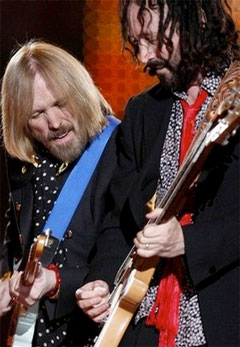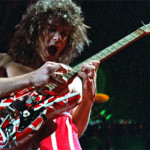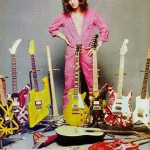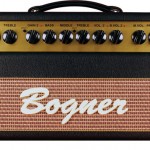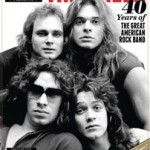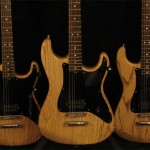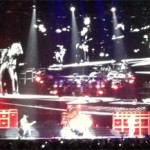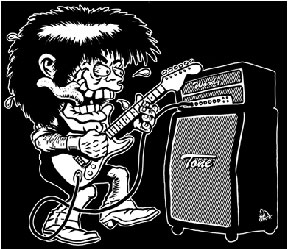Mike Campbell: Tasty Playing, Vintage Gear
Heard the Tom Petty tune “You Got Lucky” on the radio the other day, and had a flashback – about the solo on that song. It was 1982, and I was all about Van Halen, Randy Rhoads and all the rest of it. When I heard the solo back then, I laughed!
It was comically slow (that’s the way it seemed at the time), the guitar sounded big and hollow (and it was in the MTV vid – not cool at the time) and the guitar player’s sloooooooow use of the trem bar was a 180 from EVH. No thanks, said the 16-year-old me.
Well, times have changed – a little. Now I get it. I may not love it – in a way I kinda do, though – but I get it. It doesn’t make me want to grab my guitar and play all night, but I get it. You get what I’m saying.
The guy who played that solo and co-wrote the song is, of course, Tom Petty’s guitar player – really a band member and co-writer rather than a hired hand. His name is Mike Campbell, and yes, he is a master of understated, toney guitar.
I still…can’t…say that he’s someone I would choose to emulate – I’m thinking about buying a 5150 head, for cryin’ out loud! – but now I can dig what he does. Maybe you can too. Maybe you already do.
Here are some Q&As along the above lines from an April 2008 PremierGuitar.com interview:
PG: You came out of the era of the big guitar hero, but you managed to avoid all the excess wanking that made a lot of their records seem self-indulgent and ultimately sound very dated. I have always likened you to a George Harrison or Keith Richards type of player; someone that was always very sympathetic to playing exactly what fit the song versus showboating.
Mike: We came up out of Florida and at that time, there were a lot of Allman Brothers, Lynyrd Skynyrd-type bands. And we liked that stuff, but what we loved even more than that was early Beatles and the Stones – three-minute songs, with good guitar parts and not necessarily long guitar solos. We just preferred that style of music, and figured out early on that all of those other bands were trying to sound like the Allman Brothers, and we didn’t want to do that, we wanted to do what we liked. And that’s really always been our approach!
PG: How do you approach soloing? Do you work stuff out beforehand, simply let it flow, or is it a combination of both?
Mike: The song comes in, and the purpose is to serve the song, not the guitar part. You used George Harrison and Keith Richards as examples; really cool rhythm parts played between the vocal, with a short solo that says something then gets out of the way for the next vocal. It’s a challenge to make your statement in a short amount of time, but I prefer that challenge as opposed to just stretching out. We can do that too, and nowadays we will stretch out a few things, but anytime that it starts to drift away from the song, we kind of lose interest.
Mike also said:
“I play the guitar all of the time, but I’m not interested in playing faster, or more technically. I always try to work on my rhythm and my tone and my song sense – that’s just something that I focus on and always try to get better at. But am I better than I was? I don’t know. In some ways I’m the same as I always was. I think I’m more mature and may make better choices in my composition than I might have earlier.”
A couple more Q&As:
PG: Are there any current players you are listening to these days?
Mike: I struggle to think of someone recently – I tend to gravitate toward older players that influenced me originally. I love J.J. Cale, but he’s been around for years, and I like Mark Knopfler, who I think emulates J.J. I do like Derek Trucks, I think he’s amazing. A lot of the new bands, though, have a different approach to guitar than back when I started. I don’t like flashy stuff – I like songs with good melodies and it seems that no one is doing that these days.
PG: What is your take on the state of rock n’ roll today?
Mike: It’s alive – you can’t kill it. When I play with my little band at clubs, there are moments that make me remember why I started doing it, playing in a room with 100 people or whatever, and there are moments that are as pure as anything in its own way. We may not have the songs or the hits, but there is a purity in a room with a band that’s got a sound and is playing to a small group, and it’s all happening in this little room – to me, that is where rock n’ roll is still alive. It’s hard for me to put that into words, but to me it’s like a religion, it’s just gotta be, and it always will be, because there is nothing like it. It’s the best medicine for the soul that’s ever been.
Gear
Mike’s obviously a guy who likes vintage-type tones (who doesn’t!). Here’s some notes on his gear, from the PG article and a 2008 edition of the ToneQuest Report.
Guitars
1950s Fender Broadcaster
1964 Fender Stratocaster
1968 Gibson Les Paul goldtop
1960s 1956 Gretsch Fire Jet
1970s Les Paul Custom
Duesenberg USA DMC TV Mike Campbell model
Amps
Early 1960s Vox AC30 (fawn levant)
Mid-60s Vox Super Beatle
Late 1950s Fender Tweed Deluxe
1970s Fender Super Six
1960s blackface Fender Princeton
1960s Ampeg Rocket
Kustom 200
Early 1960s Fender Bassman (white piggyback)
> “Right now my favorite setup, which I kinda found with my little band in the clubs but I use onstage now with the Heartbreakers, is a tweed Deluxe and a blackface Fender Princeton together behind the [Vox] Super Beatles, and an isolated Vox AC30 that I have backstage in a box. The guy up front can pull up any of those amps that fit the room that night, but mostly it’s the blackface Princeton and the tweed Deluxe, which is a ’59. Those two amps sound really great together.”
> “Those Super Beatles are on stage now – I’m not actually playing through them but Tom does on a couple of songs. Behind them are the things that we are actually using in the mix.”
> He said he used Vox AC30s a lot during the band’s “middle years” – because the band loved the Beatles and assumed that’s what the Beatles used.
> Here’s the “You Got Lucky” vid (can’t embed). The solo, presumably with the above-mentioned Gretsch Tennessean, starts at 3:03.
> Here’s a live version (also can’t embed), with the solo on a modified Tele, starting at about 2:00.
Category: Fender, Mike Campbell, Vox

